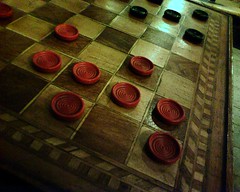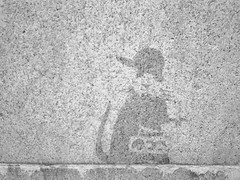

The trouble with seeing a whole bunch of movies all at once is that you start to see similarities between them where none may actually exist.
Take the summer blockbuster
Harry Potter and the Order of the Phoenix and the quietly controlled German film
The Lives of Others (Das Leben der Anderen).
Bear with me.
The Lives of Others picked up a fresh head of steam when it landed an Academy Award, and is currently making another tour of the art houses in the U.S.;
Harry Potter, of course, is playing everywhere, all the time.
In each film the protagonists’ beloved home (Hogsworth, the GDR) has taken on a grey pall under the controlling machinations of the acting administrator – Imelda Staunton's polished rose-colored Dolores Umbridge in
Harry Potter, and the massively, powerfully grunting presence of Thomas Thieme as Minister Bruno Hempf in
The Lives of Others.
Our hero in each (Daniel Radcliffe as Harry; Sebastian Koch as Georg Dreyman), chiseled of jaw and sporting the black rimmed glasses that serve as the universal signifier for “smarter than the average bear”, pursues secret means by which to act against an oppressive state – Harry by holing up and teaching wizardry to his classmates in a hidden chamber; Dreyman by using a contraband red-inked Olivetti that he hides under a doorsill so that he cannot be connected to an essay, critical of the GDR, published pseudonymously in
Der Spiegel.


The lovely ingénue in each of the films (Katie Leung as Cho Chang; Martina Gedeck as Christa-Maria Sieland) after captivating the glandular attention of our hero, is pressed into an impossible situation which leads to her to betray those most dear to hear.
But the comparison that struck me, and led me down this ridiculous path of mapping characters and events across two impossibly different films, was the intervention at the end – the intercession of the actor compassionate to the cause, who endangers his own life to save the lives of those he loves.
Not so remarkable in
Harry Potter, where it’s expected – grizzled old wizards, after all, are expected to pull out their wands and toss lightening bands around to assist those under their tutelage.
It was in
The Lives of Others that the quiet act of defiance by the Stasi Hauptmann Gerd Wiesler (played to perfection by Ulrich Mühe, who regrettably
passed away just recently from cancer at 54) made such a lasting impression.
Slowly he comes to love the playwright and the actress whom he secretly monitors, while sequestered away in their attic, tapped into the wires that run through each wall of their home – loves the way they love each other, loves the conviction and purpose with which they pursue their art – almost as much as he despises the motives of the truculent Hempf who wants them monitored for his own selfish advantage – until finally Wiesler finds himself acting in defiance of the State that he has invested his professional life to defend through surveillance and subterfuge.
A stretch, maybe, to compare these two together – but it’s the theme at the core common to each that captivated me – the willingness to adopt hidden means by which to overcome an oppressive State that imposes limits on the human spirit and our inalienable rights. To see two popular films – admittedly made or staged elsewhere, but blessed with box office here in the U.S. which is how we confer acceptance – gave me hope that folks are working up the courage to speak out against the phone tapping and the surveillance and the loss of personal freedoms that have come in the wake of the Bush Administration’s handling of 9/11.
After all, we don’t talk about it much – not to the extent that others elsewhere may be talking about the change that has come over us, and when we do bring it up it’s in left leaning channels where conversations like these are expected but largely ignored by those who don’t consider themselves left-leaning. But
Harry Potter is mainstream, and
The Lives of Others became so when it won an Academy Award and received wider distribution.
My naïve hope? That the larger America is finally fed up, and that something’s stirring.
At last.






















































